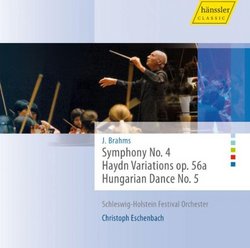A good Fourth from an experienced Brahmsian
Santa Fe Listener | Santa Fe, NM USA | 10/03/2009
(4 out of 5 stars)
"When he was abruptly dismissed from the conductorship of the Philadelphia Orch., Eschenbach didn't wind up in the wilderness. He gained the Orchestre de Paris, and besides guest engagements all over Europe, he has a second orchestra in Schleswig-Holstein, one of the good provincial ensembles that Germany prides itself on. It's my bias that he was fired for cause in Philadelphia; I found his conducting coarse and affected at the same time. But Eschenbach's Mahler cycle with Houston (BMG) had its fans, so the Fourth Sym. is well-trod territory for him.
Nothing goes wrong here. This is a solid, straightforward account, like Daniel Barenboim when he's behaving himself and not pretending to channel Furtwangler's ghost. Eschenbach has a few notions in that direction himself. He likes to use little swells and sighs as he shapes the line. Anyone who prefers the steady beat and constant momentum of a Toscanini or Szell won't find that here. The first movement rises and falls expressively. For me, the second movement of the Fourth verges on tragic mystery in its intensity, but not every conductor hears it that way. Eshenbach applies a little moodiness but otherwise offers us a calm pastoral. The result is the spitting image of a Gunter Wand interpretatin, which will comes as good news to those who want a second Gunter Wand.
The Scherzo is marked Allegro giocoso, and Furtwangler can be accused of starting the trend away from the jocose into more serious territory. Eschenbach stays true to the score's markings; this is a cheerful, well-modulated account without undue starts and stops, always a temptation in this movement. The passacaglia finale can take as much weight as anyone cares to give it, however, or one can follow Toscanini and apply fierce, forward-moving energy. Eschenbach loses inspiration and plods at the outset. In some of the variations he finds cause to swoon and sway, which I find rather vulgar. If you don't think this is tragic music, at least it should have classical rigor, as ?Brahms intended. Yet overall we get Wand-like moderation and good playing. In fact, one can't fault the musicians or the engineers. This live recording could be a studio product except for a few prominent coughs from the audience.
In short, this is better than workaday Brahms, and as a non-fan of Eschenbach's, I have to acknowledge that he avoids any major pitfalls to give a nicely balance dreading with some engaging touches. Maybe Wand is back.
"


 Track Listings (6) - Disc #1
Track Listings (6) - Disc #1